How to recognize scam pages like azurewebsites.net
Phishing/ScamAlso Known As: Azurewebsites.net virus
Get free scan and check if your device is infected.
Remove it nowTo use full-featured product, you have to purchase a license for Combo Cleaner. Seven days free trial available. Combo Cleaner is owned and operated by RCS LT, the parent company of PCRisk.com.
What kind of page is azurewebsites[.]net?
Microsoft Azure Web Sites is a web-hosting platform based on cloud computing, a legitimate service developed by Microsoft. It supports multiple technologies and programming languages (such as .NET, PHP, node.js, Python, and so on). As part of creating a website, the site's URL is assigned a subdomain of azurewebsites[.]net.
In various for-pay tiers, a website can be assigned one or more custom domains, however, this service is often misused by scammers and malware (malicious software) distributors. In this particular case, it is misused to promote a tech-support scam.
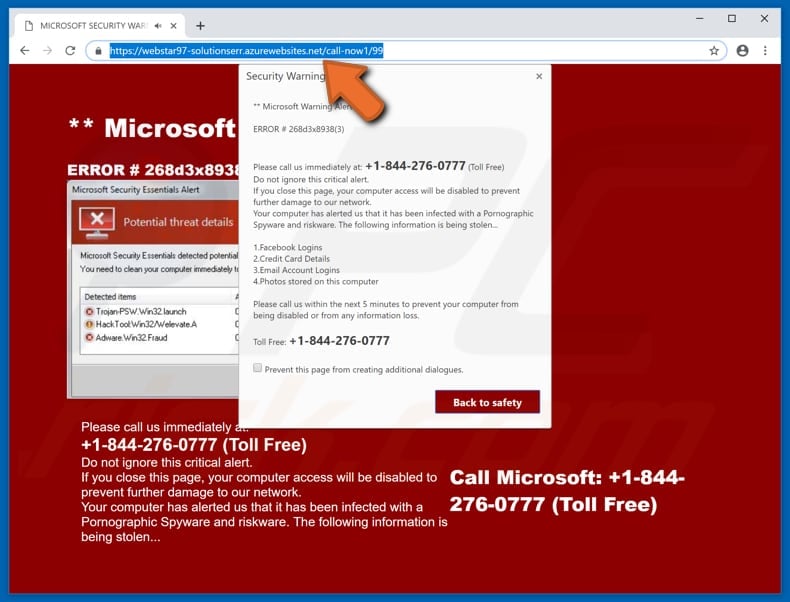
More about the azurewebsites[.]net scam website
Typically, tech-support scams are promoted using dubious websites that are opened by unwanted applications installed on the system or through clicked deceptive advertisements. This scam is presented as a security warning from Microsoft, however, this company has nothing to do with it.
Scammers often use well-known company names to disguise their scam pages as official and legitimate. Once opened, this site displays a pop-up window stating that "ERROR # 268d3x8938(3)" has occurred and encourages users to contact scammers via the "+1-844-276-0777" telephone number within five minutes.
They go on to state that users must prevent their computers from being disabled and avoid data loss. People are urged not to ignore this 'critical error', since ignoring it (closing the scam website) might result in a disabled and damaged system.
This pop-up also states that the user's computers was infected with spyware that was used to steal Facebook and email account login details, credit card information, and photos that were stored on the computer. We strongly recommend that you ignore this scam.
It is safe to close the website, however, if you are unable to do this in the normal way, terminate the browser process using the Task Manager. The closed browser session should not be restored, since this will reopen the scam page.
This scam was probably opened by installed unwanted software, which can cause unwanted redirects, serve users with intrusive advertisements, and gather information relating to users' browsing habits. Displayed ads are usually various pop-up ads, coupons, banners, surveys, and other unwanted content.
If clicked, they open untrustworthy websites or run scripts designed to download and install other unwanted apps. When installed, certain untrustworthy apps continually gather IP addresses, geolocations, entered search queries, URLs of visited websites, and other data of this kind.
Some might also record personal, sensitive details. In any case, developers share collected data with other parties (potentially, cyber criminals) who misuse it to generate revenue. Thus, questionable apps should be removed/uninstalled immediately.
| Name | Azurewebsites.net virus |
| Threat Type | Phishing, Scam, Social Engineering, Fraud. |
| Fake Claim | The fake error message claims that the system is infected and the user's account credentials/photos stored on the computer are at risk. |
| Tech Support Scammer Phone Number | +1-844-276-0777 |
| Symptoms | Fake error messages, fake system warnings, pop-up errors, hoax computer scan. |
| Distribution methods | Compromised websites, rogue online pop-up ads, potentially unwanted applications. |
| Damage | Loss of sensitive private information, monetary loss, identity theft, possible malware infections. |
| Malware Removal (Windows) |
To eliminate possible malware infections, scan your computer with legitimate antivirus software. Our security researchers recommend using Combo Cleaner. Download Combo CleanerTo use full-featured product, you have to purchase a license for Combo Cleaner. 7 days free trial available. Combo Cleaner is owned and operated by RCS LT, the parent company of PCRisk.com. |
Similarities with other technical support scams
This tech-support scam is very similar to others such as "Error Code 09-986-6321", "Error XR01F5", and "Windows Defender Alert (0x3e7)". Scammers often use them to trick people into paying for technical support or software. Once contacted, these criminals try to make people believe that they must solve the so-called issues immediately using their services or products.
None of these scams should be trusted. Apps promoting such scams also share many similarities. Most are presented as legitimate, however, once installed they simply cause problems - they generate revenue for developers by causing unwanted redirects, displaying intrusive ads, and gathering data.
How did unwanted applications install on my computer?
Common ways to download/install unwanted apps are through intrusive ads or when they are bundled with other software. Bundling is a deceptive marketing method used to trick people into downloading and installing unwanted apps with other, regular software in a stealthy way. These apps are usually hidden in "Custom", "Advanced" and other similar sections of the software set-ups.
In summary, information regarding the inclusion of apps into set-ups is not properly disclosed. Generally, people who skip steps (leave all settings unchecked) install their chosen software, but also with unwanted apps.
How to avoid installation of unwanted applications?
Avoid using third party software installers and downloaders, torrent clients, eMule and other Peer-to-Peer networks or unofficial websites to download software. Use only official pages and direct download links. Check all available "Advanced", "Custom" and other similar settings of software setups and deselect offers to download or install unwanted programs.
Avoid clicking intrusive ads. Once clicked, they often redirect to untrustworthy and potentially malicious websites such as pornography, gambling, adult dating, and so on. If these ads and unwanted redirects happen regularly, check your browser for unwanted extensions, add-ons, and plug-ins, and remove them.
Also uninstall any unwanted programs. If your computer is already infected with rogue applications, we recommend running a scan with Combo Cleaner Antivirus for Windows to automatically eliminate them.
Text presented in "azurewebsites[.]net" pop-up:
** Microsoft Warning Alert **
ERROR # 268d3x8938(3)
Please call us immediately at:
+1-844-276-0777 (Toll Free)
Do not ignore this critical alert.
If you close this page, your computer access will be disabled to prevent further damage to our network.
Your computer has alerted us that it has been infected with a Pornographic Spyware and riskware. The following information is being stolen...
Call Microsoft: +1-844-276-0777 (Toll Free)
The appearance of "azurewebsites[.]net" pop-up (GIF):
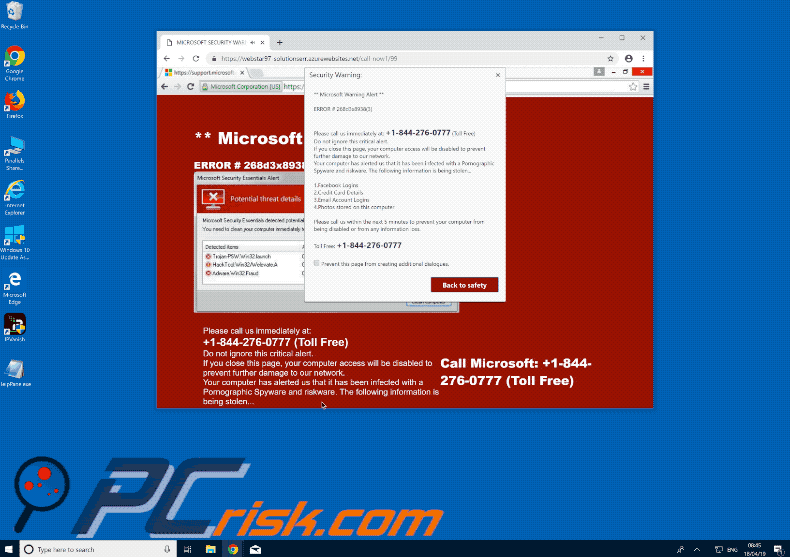
Another variant of azurewebsites[.]net pop-up scam:
![azurewebsites[.]net pop-up scam (sample 2)](/images/stories/screenshots201909/azurewebsitesnetupdate-2019dec17secondvariant.gif)
Examples of other pop-up scams promoted using azurewebsites[.]net service:
Example of a deceptive website (stored on azurewebsites[.]net) designed to trick users into permitting display of browser notifications so that ads could be served:
![Website on azurewebsites[.]net displaying browser notifications](/images/stories/screenshots202309/azurewebsites-net-pop-up-scam-update-2023-09-05-browser-notifications.jpg)
Appearance of such site (GIF):
![Website on azurewebsites[.]net displaying browser notifications (GIF)](/images/stories/screenshots202309/azurewebsites-net-pop-up-scam-update-2023-09-05-browser-notifications-gif.gif)
Screenshot of a deceptive browser notification delivered by a site stored on azurewebsites.net:
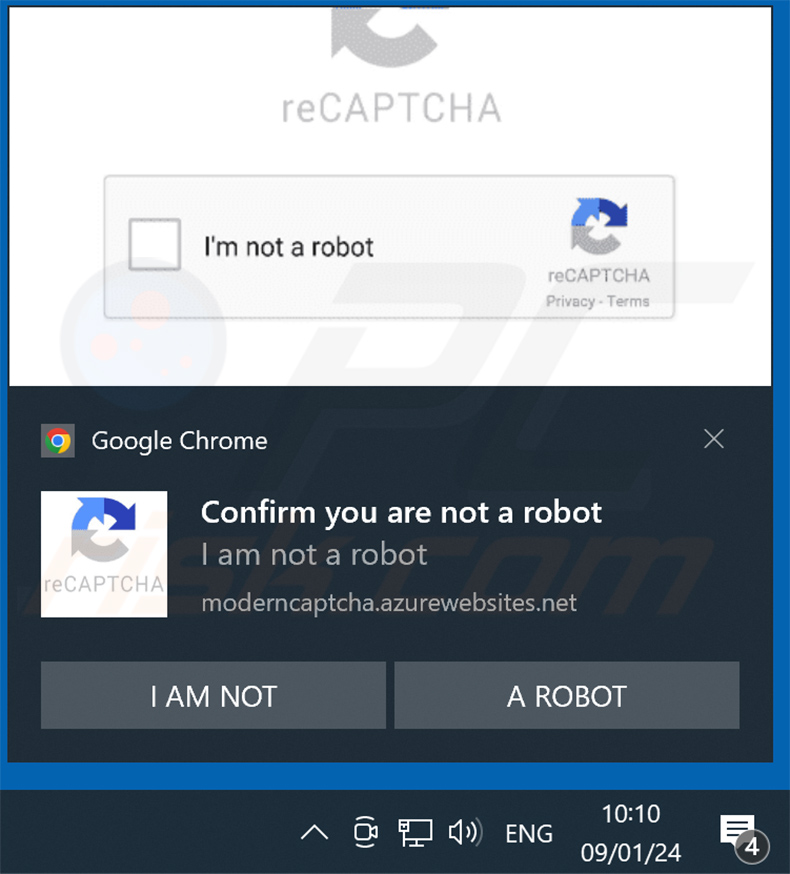
Instant automatic malware removal:
Manual threat removal might be a lengthy and complicated process that requires advanced IT skills. Combo Cleaner is a professional automatic malware removal tool that is recommended to get rid of malware. Download it by clicking the button below:
DOWNLOAD Combo CleanerBy downloading any software listed on this website you agree to our Privacy Policy and Terms of Use. To use full-featured product, you have to purchase a license for Combo Cleaner. 7 days free trial available. Combo Cleaner is owned and operated by RCS LT, the parent company of PCRisk.com.
Quick menu:
- What is Azurewebsites.net virus?
- How to identify a pop-up scam?
- How do pop-up scams work?
- How to remove fake pop-ups?
- How to prevent fake pop-ups?
- What to do if you fell for a pop-up scam?
How to identify a pop-up scam?
Pop-up windows with various fake messages are a common type of lures cybercriminals use. They collect sensitive personal data, trick Internet users into calling fake tech support numbers, subscribe to useless online services, invest in shady cryptocurrency schemes, etc.
While in the majority of cases these pop-ups don't infect users' devices with malware, they can cause direct monetary loss or could result in identity theft.
Cybercriminals strive to create their rogue pop-up windows to look trustworthy, however, scams typically have the following characteristics:
- Spelling mistakes and non-professional images - Closely inspect the information displayed in a pop-up. Spelling mistakes and unprofessional images could be a sign of a scam.
- Sense of urgency - Countdown timer with a couple of minutes on it, asking you to enter your personal information or subscribe to some online service.
- Statements that you won something - If you haven't participated in a lottery, online competition, etc., and you see a pop-up window stating that you won.
- Computer or mobile device scan - A pop-up window that scans your device and informs of detected issues - is undoubtedly a scam; webpages cannot perform such actions.
- Exclusivity - Pop-up windows stating that only you are given secret access to a financial scheme that can quickly make you rich.
Example of a pop-up scam:

How do pop-up scams work?
Cybercriminals and deceptive marketers usually use various advertising networks, search engine poisoning techniques, and shady websites to generate traffic to their pop-ups. Users land on their online lures after clicking on fake download buttons, using a torrent website, or simply clicking on an Internet search engine result.
Based on users' location and device information, they are presented with a scam pop-up. Lures presented in such pop-ups range from get-rich-quick schemes to fake virus scans.
How to remove fake pop-ups?
In most cases, pop-up scams do not infect users' devices with malware. If you encountered a scam pop-up, simply closing it should be enough. In some cases scam, pop-ups may be hard to close; in such cases - close your Internet browser and restart it.
In extremely rare cases, you might need to reset your Internet browser. For this, use our instructions explaining how to reset Internet browser settings.
How to prevent fake pop-ups?
To prevent seeing pop-up scams, you should visit only reputable websites. Torrent, Crack, free online movie streaming, YouTube video download, and other websites of similar reputation commonly redirect Internet users to pop-up scams.
To minimize the risk of encountering pop-up scams, you should keep your Internet browsers up-to-date and use reputable anti-malware application. For this purpose, we recommend Combo Cleaner Antivirus for Windows.
What to do if you fell for a pop-up scam?
This depends on the type of scam that you fell for. Most commonly, pop-up scams try to trick users into sending money, giving away personal information, or giving access to one's device.
- If you sent money to scammers: You should contact your financial institution and explain that you were scammed. If informed promptly, there's a chance to get your money back.
- If you gave away your personal information: You should change your passwords and enable two-factor authentication in all online services that you use. Visit Federal Trade Commission to report identity theft and get personalized recovery steps.
- If you let scammers connect to your device: You should scan your computer with reputable anti-malware (we recommend Combo Cleaner Antivirus for Windows) - cyber criminals could have planted trojans, keyloggers, and other malware, don't use your computer until removing possible threats.
- Help other Internet users: report Internet scams to Federal Trade Commission.
Frequently Asked Questions (FAQ)
What is a pop-up scam?
It is a fake system warning, virus alert, or other deceptive message urging users to perform certain actions.
What is the purpose of a pop-up scam?
In most cases, scammers use pop-up scams to trick users into providing sensitive information, downloading malware, purchasing fake or unnecessary software (or services), or providing remote access to computers.
Why do I encounter fake pop-ups?
Fake pop-ups are usually displayed on shady websites. These websites rarely are opened on purpose. They get opened via shady advertisements, other pages that use rogue advertising networks, browser notifications, installed adware, or other dubious software.
Will Combo Cleaner protect me from pop-up scams?
Combo Cleaner can scan websites and determine whether they are malicious. It can detect websites designed to display pop-up scams too. Thus, this application will warn you about untrustworthy pages and restrict access to them.
Share:

Tomas Meskauskas
Expert security researcher, professional malware analyst
I am passionate about computer security and technology. I have an experience of over 10 years working in various companies related to computer technical issue solving and Internet security. I have been working as an author and editor for pcrisk.com since 2010. Follow me on Twitter and LinkedIn to stay informed about the latest online security threats.
PCrisk security portal is brought by a company RCS LT.
Joined forces of security researchers help educate computer users about the latest online security threats. More information about the company RCS LT.
Our malware removal guides are free. However, if you want to support us you can send us a donation.
DonatePCrisk security portal is brought by a company RCS LT.
Joined forces of security researchers help educate computer users about the latest online security threats. More information about the company RCS LT.
Our malware removal guides are free. However, if you want to support us you can send us a donation.
Donate
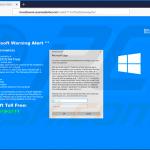

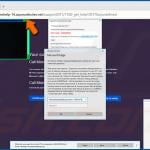

▼ Show Discussion